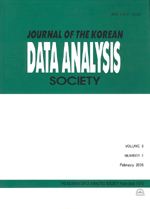메시지 프레이밍, 집단주의적 성향, 기후변화 방지 캠페인 태도
Message Framing, Collectivism, and Attitudes towards a Climate Change Mitigation Campaign: Mediated Moderating Effect of Collectivism through Self-Efficacy
- 한국자료분석학회
- Journal of The Korean Data Analysis Society (JKDAS)
- Vol.17 No.4
-
2015.082139 - 2152 (14 pages)
- 이용수 121

키워드
초록
본 연구는 친사회적(pro-social) 행위를 목표행위로 하는 기후변화 방지 캠페인에서 수용자의 집단주의적 성향이 캠페인 메시지 프레이밍의 설득효과에 영향을 미치는 조절변인으로 작용한다고 제안하고, 이를 2(프레이밍: 이익 vs. 손실) x 2(집단주의적 성향: high vs. low) 피험자간 요인 설계(between-subject factorial design) 분석을 통하여 검증하였다. 더불어, 프레이밍과 집단주의적 성향간의 상호작용 효과가 캠페인에 대한 태도로 발현되는 과정에서 자기 효능감(self-efficacy)이 심리적 기제로 작용한다고 가정하고, 이를 매개된 조절모형 분석(mediated moderation analysis)을 통해 분석하였다. 분석결과, 프레이밍과 집단주의적 성향 간의 상호작용은 유의미한 것으로 나타났으며, 특히 이익 프레이밍의 효과는 집단주의적 성향이 높은 실험 참가자들에게서만 나타났다. 더불어 캠페인에 대한 태도에 미치는 메시지 프레이밍과 집단주의적 성향 간의 상호작용효과는 자기 효능감을 통해 완전 매개되는 것으로 나타났다.
Given the fact that a climate mitigation campaign is designed to encourage society-wide pro-social behavior, this study examined whether a message-recipient’s collectivistic tendency moderates the effects of message framing on campaign attitudes. To test this hypothesis, a 2 (message framing: gain vs. loss) x 2 (collectivism: high vs. low) between-subject factorial design experiment was conducted. In addition, this study investigated the role of self-efficacy as mediating the moderating effect of collectivism, using the procedures recommended by Muller, Judd, Yzerbyt (2005). Consistent with the predictions, the study results indicate that compared to loss framing, gain framing led to more favorable campaign attitudes only among the participants in the high collectivism condition. Among the participants in the low collectivism condition, no interaction effect was observed. The findings from a mediated moderation analysis further suggest that the foresaid interaction effect was completely mediated via self-efficacy.
목차
1. 서론
2. 이론적 배경 및 기존 연구
3. 연구방법
4. 결과
5. 결론 및 제언
References
참고문헌 (0)
등록된 참고문헌 정보가 없습니다.
해당 권호 수록 논문 (0)
등록된 수록 논문 정보가 없습니다.